They hadn’t stepped foot onto a football pitch for more than two years – 981 days to be exact – but Chile’s national team made quite an impact on its return.
The match had barely been advertised, not in the media nor by the country’s football federation, but still more than 10,000 fans turned up at Santiago’s Estadio Nacional to watch them beat Peru 12-0.
This, of course, was not the men’s national team but the women’s, a team which had endured years in the wilderness under the country’s football association (ANFP).
Such was the neglect of women’s football in the country, an all too familiar feature across South America, Chile had been removed entirely from FIFA’s world rankings for being “inactive”.
This was caused by a combination of the ANFP’s then-president Sergio Jadue being implicated in the FIFA corruption scandal – for his part, he pleaded guilty to racketeering conspiracy and wire fraud conspiracy – and ingrained societal sexism.
“It made me mad,” Iona Rothfeld, who played for the national team at the time, told CNN. “But it mainly made me sad, because we fought for that ranking. I know all the effort that we made and my teammates made before me and after me.”
But Chile wasn’t alone. By 2016, more than half of the continent’s 10 national teams had been given “inactive” status by the sport’s governing body.
The match in May 2017 not only revealed the national team had a naturally gifted squad which could thrive given adequate resources and support, but that an appetite for women’s football existed within the country.
READ: How Bob Marley’s daughter saved Jamaican women’s football
READ: Why ‘shaking things up’ is more important than playing at Women’s World Cup
‘Nobody cared’
Despite the complete disregard with which the women were treated, they continued to play – for both the national team and in the domestic league.
They did not do it for fame or fortune – many had to finance themselves – but played because wearing the red, white and blue of the national team had been a shared dream since childhood.
But the national team’s lost ranking, something which they had trained, competed and struggled for over many years – reaching a high of 41 in 2014 and 2015 – proved to be the final straw.
“It’s unfair,” Rothfeld says. “It’s unfair because we do it out of love, out of passion, not because there’s a chance to get famous or make money to get a future.
“And just because nobody cared, nobody was willing to give us the respect that we deserved. We just didn’t matter.”
Rothfeld says the national team stopped training altogether and the players received no explanation from the ANFP as to why the women’s program had seemingly been disbanded.
When Jadue’s successor, Arturo Salah, took charge, the ANFP say that it made “a complete diagnosis of the reality of women’s football in Chile,” a process that has been continued under current president Sebastian Moreno.
“It was detected that, for different reasons, the sport was immersed in an absolute abandonment,” the organization told CNN.
Determined to change the way in which women football players were being treated in the country, not only for themselves but for future generations, a group of players formed the National Association of Female Footballers (ANJUFF).
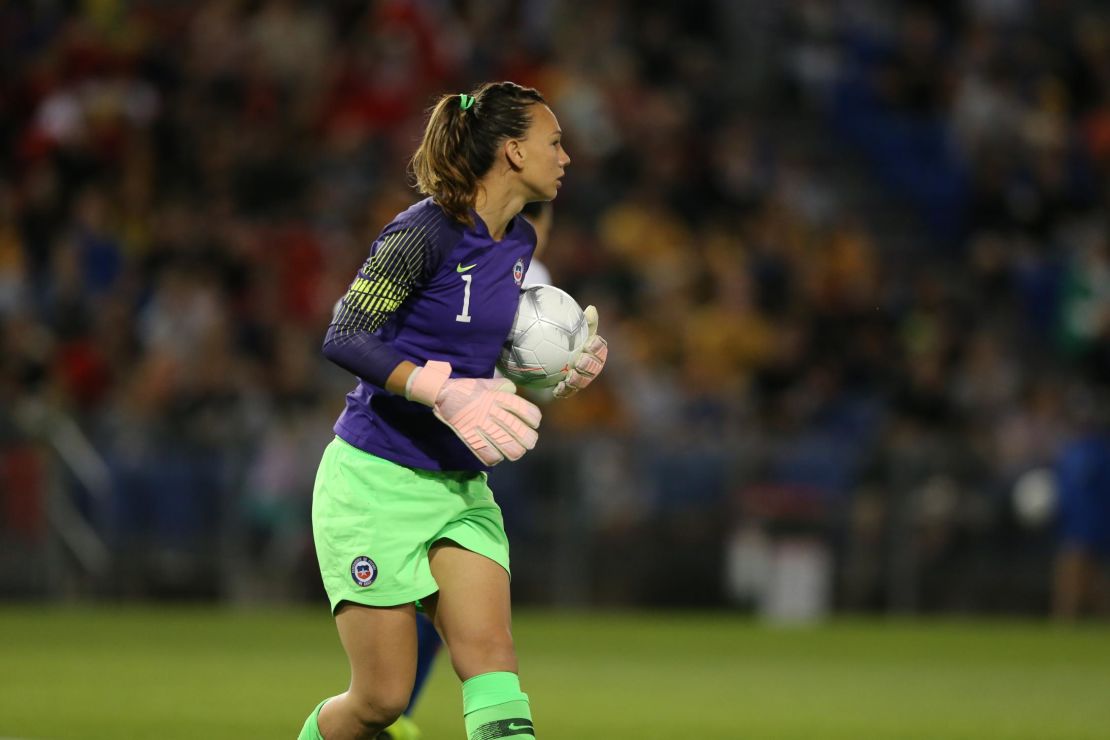
Among them was Rothfeld, who no longer plays for the national team but remains a director for the association, and Christiane Endler, Chile’s national team captain and goalkeeper for PSG Féminines in France.
“I was outraged not with the lack of opportunity, but it was the lack of respect shown to women soccer players,” Rothfeld, who is a now a student-athlete in the US, says. “And that was the trigger that made me and the other players gather and make this project work.
“The main idea was just to make the authorities grab the responsibility they hadn’t grabbed in many, many years. So this association, the thing that we wanted to put out there was that we were being treated differently just because we were women.
“But we were soccer players, we were in the national team, we had won and participated internationally. We don’t make a living, but it’s our life and we should be respected.”
Endler, the most high profile player in the squad, offered her support when the organization was founded.
“For me it was important that there was some institution that will watch over the rights of female players in my country,” Endler told CNN, “that will fight to improve conditions and to help the players with any problem and any eventuality.
“The idea was born from her [Rothfeld] and when she told me about it I thought it was a very good idea and I helped how I could at the time.”
‘Ashamed’
For the 2014 South American Games, hosted in Santiago, the men’s football competition was contested by the continent’s under-17 national teams, while full female national teams took part in the women’s competition.
Rothfeld assumed the boys and the women would receive the same treatment as they prepared for the Games. However, she says it became immediately obvious that would not be the case.
“The treatment that we got every day was awful. So we said: ‘Well, this is enough, we need to do something.’ It was really sad, the feeling, because the years that I played for the national team, for me, were by far the best years of my life.
“I still remember every game I played, every time I sang the national anthem, every goal I scored – everything. I got lucky to be in a team that qualified to a Under-17 World Cup in 2010 and I’m never going to forget that moment.
“And it’s not that I need society to validate our achievements but when they are telling about all the times Chile has qualified for a World Cup and they forgot to mention us, that really hurts,” Rothfeld said.
While the under-17s were given access to the men’s national team facilities and dormitories to rest in, according to Rothfeld the women were made to sit and “rest” in a classroom between double training sessions.
Rothfeld said she felt “ashamed” at being so underappreciated but says a climate of fear existed which prevented the women from speaking up, scared they would lose their place in the national team.
“We were told all of our lives that’s how that things were and that things weren’t going to change for us, and that we should be appreciative of what we had,” she says.
“That’s how we were taught to feel about it and I felt like that for many, many years. I started in the national team when I was 13 and I was living my dream – I always dreamt of being in the national team.
“So I wasn’t going to complain because I thought I was going to be treated like a professional soccer player. I was being treated like a princess that wanted to play soccer, that it wasn’t my sport. But I wasn’t gonna complain because in my mind, I was fulfilling a dream.”
‘They didn’t allow us on the grass’
The culture of neglect is an experience shared by girls across the country. Maria Jose Rojas – Chile’s star forward and current player for Champions League side Slavia Prague – says she wasn’t even permitted to set foot on grass to train.
“There were many barriers and not many opportunities,” Rojas recalls of her days training as a 13-year-old. “You know, I was very lucky to have a woman coach and that helped me a lot, she encouraged me to always fight.
“But it was very difficult because I didn’t get paid in Chile for playing, not even for public transportation. I was doing it for the love, for the passion.
“Many times at my club, it was a big club in Chile, we were training in the parking lot because they didn’t allow us to step on the grass. Where the cars were parked we used to put on the lights. The start you never forget. We never complained, we were young, we didn’t know about anything else.”
To pursue a career as a professional footballer, Rojas left Chile at the age of 20 after being scouted and offered a US scholarship, going on to play for teams in the States, Germany, Lithuania and Japan.
Now 31, it’s been a journey that Rojas says she could never have imagined as that girl kicking a ball around on the cracked, uneven tarmac of a parking lot.
Her parents could barely afford to buy her football boots, with one pair having to last her three years. Now, she says almost incredulously, she owns five pairs.
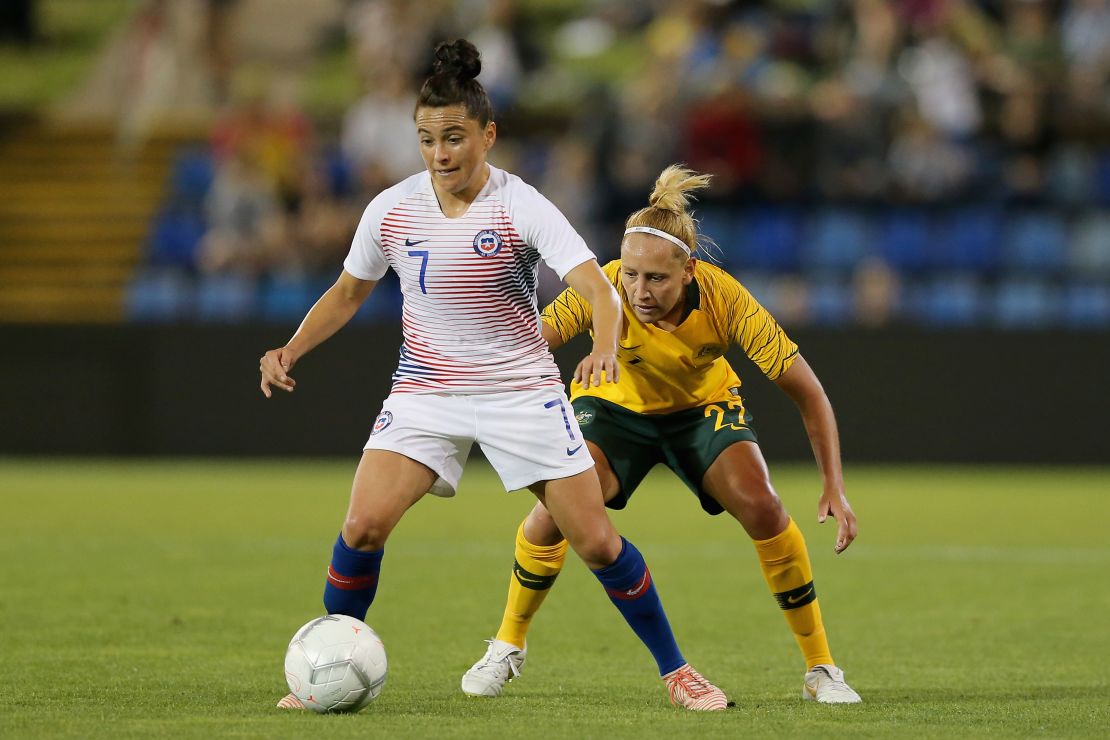
Copa America
After more than two years of inactivity, the Chilean national team thumped Peru 12-0. It was the first step on the path to forming a competitive squad for the 2018 Copa America, which Chile was set to host.
First as secretary general of Salah’s administration, then as President himself, Moreno says he made it his task to bring the Copa America to Chile.
“Understanding that a tournament of that level would be an ideal platform to boost women’s football, we decided to fight to bring it to Chile,” Moreno told CNN.
“They were months of hard and silent work in CONMEBOL [South American football’s governing body] for the tournament to be played in our country. We had to face two powerful candidates, such as Colombia, which had recently formed its professional women’s league, and Paraguay.”
Endler believes the change at the top of the ANFP was crucial to Chile winning the rights to host the biggest competition on the continent.
“I believe that it is first thanks to the constant training of the players, to the work of the national team in having important friendly matches for a good preparation before the Copa América,” Endler said.
“But I think the change came with the change of directorship at the ANFP, to appoint a coach [José Letelier] who had been developing women’s football in Colo-Colo for many years and had done very well.”
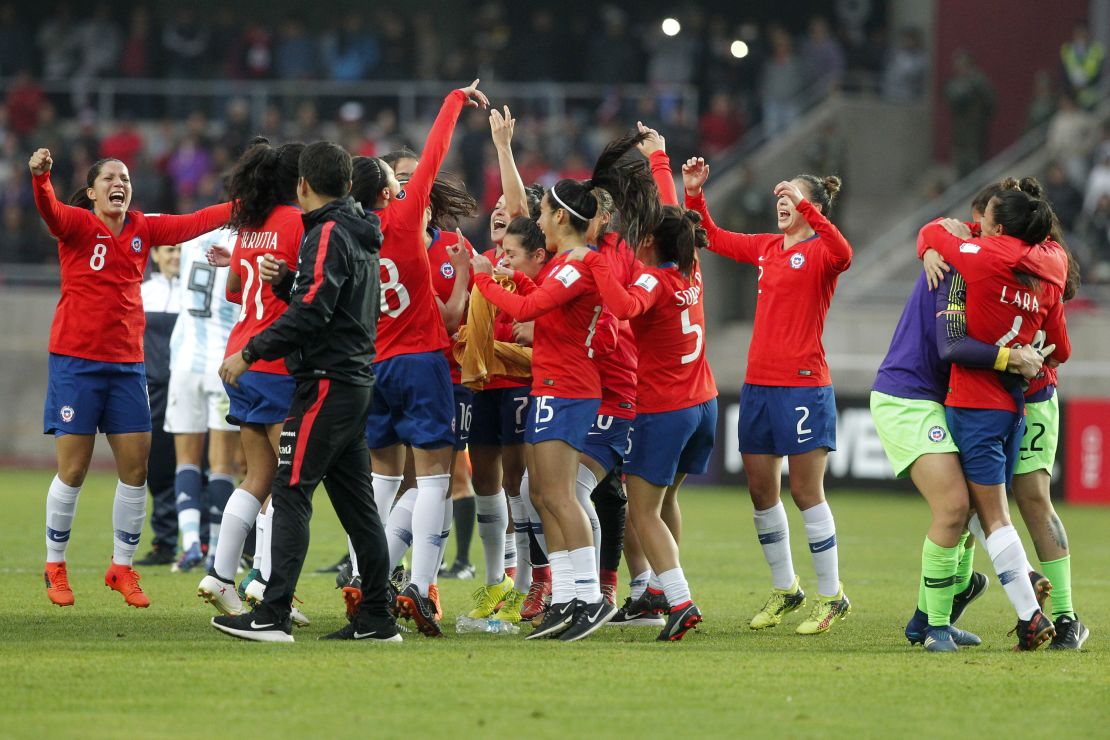
The Copa America carried extra importance, not only would the winners be crowned champions of South America, but the top teams would also qualify for the 2019 World Cup, 2020 Olympic Games and Pan American Games.
The lead-up coincided with the #MeToo movement, sparking a conversation around sexism and machismo that the sport in Chile had never seen before.
“You grow up and you realize that many things they put you through shouldn’t be like that and that’s part of, sadly, something that’s cultural,” Rothfeld says.
“I mean, being underestimated just because you’re women is something that you live every day and not only soccer, in other sports, in our industries, day to day life.”
Chile’s successful bid to host the Copa America and the participation of all 10 CONMEBOL nations was thanks largely to ANJUFF and a feat many would have thought impossible just a few months earlier.
Chile played its matches in La Serena, a city 470 kilometers north of Santiago, and each was a near-sell out in the city’s 18,243-capacity stadium, La Portada.
By the end of the tournament’s first phase, more than 80,000 fans had turned out to watch the national team across the four matches.
After two nervy draws against Paraguay and Colombia, Chile needed a win against Uruguay to guarantee a place in the final stage of the tournament.
The tension was tangible but the fans remained partisan throughout. For most, this was the first time they had watched women’s international football.
It was Rojas who provided the stadium with its moment of catharsis, latching onto a through ball and slotting a late winner past the Uruguayan keeper. La Portada erupted.
“You always dream about that moment,” Rojas said of her winning goal. “I’m always dreaming, always thinking. You never expect that to happen. You want it to happen and it did for me, it did for my team and did for Chile.
“Having 80,000 and for myself scoring the winning goal against Uruguay was amazing. When we’re playing on the street that’s the dream, you always want to be in a big stadium on grass and all those people supporting you, getting to know you as a player.
“As you know, the media tried to say that women’s football doesn’t sell, but we made them realize that it does.”
In the aftermath of the final match – a victory against Argentina that clinched second place – the team celebrated jubilantly on the pitch after securing World Cup qualification for the first time in its history.
Certain ANFP delegates were criticized by some fans and sections of the media for taking advantage of photo opportunities with the players, despite claims the organization had done very little to support women’s football.
“I would be very skeptical of their photo opportunities at the Women’s World Cup as well,” says Brenda Elsey, an historian and university professor in New York.
“All credit goes to the women players and their supporters, people in FIFPro and COFFUF, the fan organization of support that has dedicated itself to try to just spread enthusiasm for the national team.
“As far as I can tell, the ANFP has done nothing except take credit for things that they really don’t deserve any credit for.”
The ANFP refutes these claims and says it worked closely with the women to bring the Copa America to Chile for the first time.
“I personally traveled to Paraguay on several occasions,” said Moreno. “And, finally, on April 26, 2017 and with the presence of FIFA president Gianni Infantino, the confederation confirmed Chile as host of the Copa America Femenina.”
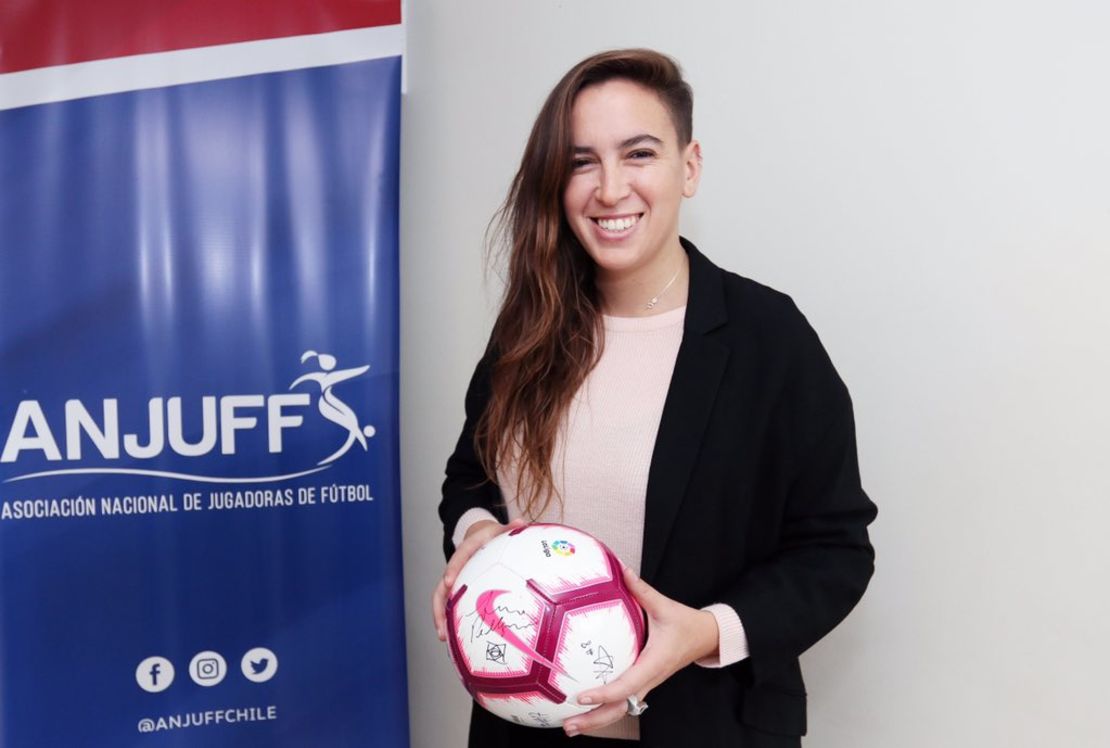
United Nations
To spread the message of equality in football around the continent, Rothfeld enlisted Elsey’s help and in August last year organized a conference at the United Nations in Chile, the first of its kind.
They invited women from across South America who they knew were interested in starting movements similar to ANJUFF but didn’t have the knowledge or support to do so.
In the months since, Colombia’s women protested against alleged mistreatment and discrimination by the country’s governing body – something the federation has denied – and fought to save the professional status of its league.
Last month, Argentine club San Lorenzo de Almagro announced the signing of the country’s first professional women’s football contracts, including Macarena Sánchez who has been at the forefront of the fight in Argentina.
“The people that led those movements were the people that we invited to Chile to this Congress,” Rothfeld says. “Chileans were so proud because we knew the people was there, we just needed to get together and get strong, and just help each other to make a difference.
“I can’t take credit, we can’t take credit for what happened. But I think we started something that was bigger than we can that we could imagine at that time.”
Though Rothfeld humbly says that she and her compatriots cannot take the credit, it’s easy to imagine the state women’s football in South America would still be in had they not been compelled to take a stand.
Elsey, whose book on the history of women and sport in Latin America will be released ahead of the World Cup, says the founding of ANJUFF was “one of the most important things to happen in women’s football in Chilean history,” with its far-reaching implications impacting the rest of the continent.
“I don’t know that they were conscious of that. But it’s pretty amazing,” she says.
“I don’t think they realized that it would be such an important milestone. But that is the same year you’re looking at the huge corruption scandals in FIFA and then this complete, utter neglect of women’s teams.
“Really nothing short of astonishing when you think about just the amount of emotional labor and energy that they put into that project.”
France 2019
Given the dire situation of women’s football in the country just two years ago, that Chile has even qualified for the Women’s World Cup in France is an achievement in itself – but they won’t be going to just make up the numbers.
In November, Chile, nicknamed La Roja, beat Australia – then ranked sixth in the world – 3-2 in Sydney and proved, on their day, they can compete with the best in the world.
Step by step, things have been improving for Chile’s players. In 2018, they played 17 matches, the most in a year in its history, and they will be flying to France for this summer’s World Cup in business class.
Rothfeld admits there is a sense of sadness she won’t be able to take to the pitch in France, but she is filled with an overwhelming sense of pride to see her former teammates achieving their collective dream.
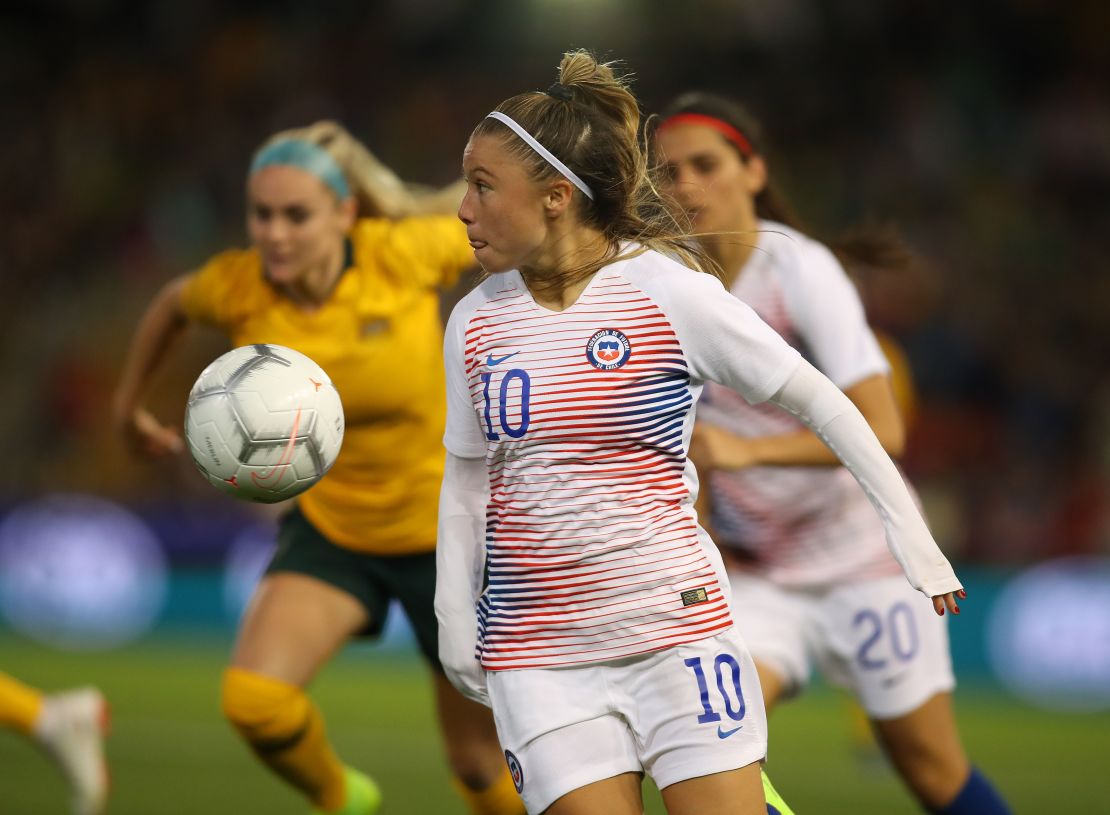
“I ended up quitting the team because of that, but that was a risk that I was willing to take and a price and was willing to pay because I was convinced that I was doing right,” she says.
“I know it brought change and this may be a big change in history and I know that the revenue is not something that I’m going to get to appreciate, it’s something that’s gonna come for the other generation.
“And that was the main goal, to make the little girls and the future female players not have the hard time that we got when we went into this, to make it a little less difficult to be a soccer player.
“Seeing them reaching that dream and saying to the world: ‘Yes, we did it, even though you thought we were never going to make it.’”

